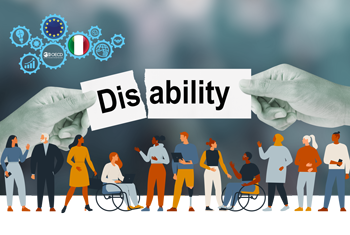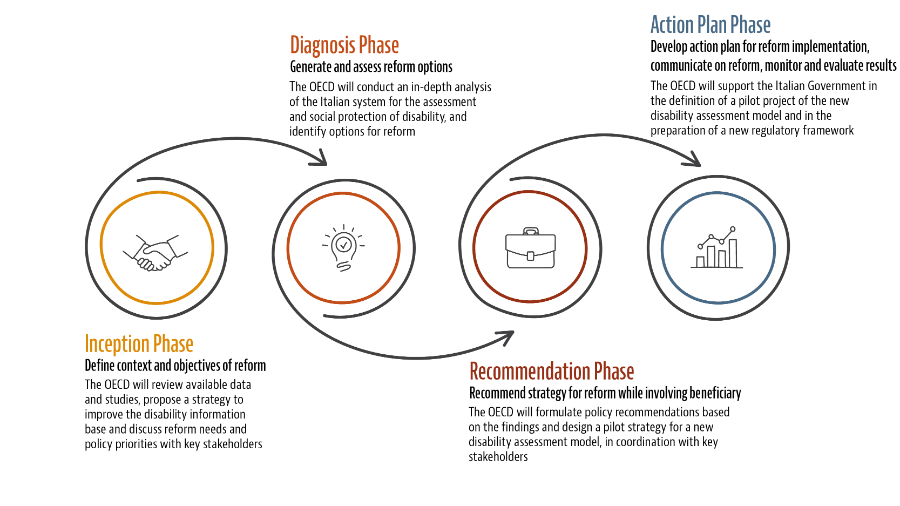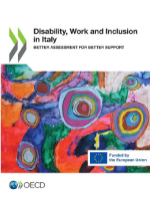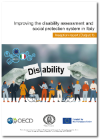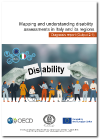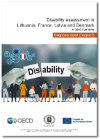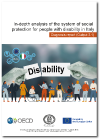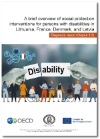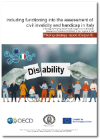Local Employment and Economic Development (LEED Programme)
Improving the disability assessment and social protection system in Italy
This project aimed to support Italy in the design, development and implementation of reforms that will increase the adequacy of disability assessment and protection system in Italy, allowing for greater participation and inclusion of people with disabilities.The project was developed by the OECD Directorate for Employment, Labour and Social Affairs and the OECD Trento Centre for Local Development at the OECD Centre for Entrepreneurship, SMEs, Regions and Cities, as well as funded by the Technical Support Instrument, and implemented in cooperation with the European Commission’s Directorate-General for Structural Reform Support (DG REFORM) and the Office for policies in support of people with disabilities of the Italian Presidency of the Council of Ministers. Implementation period: 2021-2023 Download the full project description Access the final publication (Italian version)
|
|
|
|
||
Outputs |
||||||
|
Final Publication |
||||||
|
One in seven working age adults identifies as having a disability in OECD countries. Many of them are excluded from meaningful work and have low levels of income and social engagement. Governments can help create an environment that supports social and labour market integration for people with disability. This report reviews the effectiveness of the social protection system for people with disability in Italy and summarises the results of a pilot carried out in four regions testing an alternative disability assessment. The current assessment process can sometimes deny services to people in need of support while being generous to people with significant health problems but who are not experiencing severe disability. A disability assessment that takes medical and functional aspects into account helps to direct services and resources to those most in need and to harmonise access to disability support across the country. Implementing disability reform has proved to be difficult in Italy in the past decade. This report provides evidence that reform can improve outcomes for people with disability. Italian version
Publication launch & project closure Agenda | 29 November 2023, online (IT version)
|
||||||
|
Reports |
||||||
|
Improving the disability assessment and social protection system in Italy
|
Mapping and understanding disability assessments in Italy and its regions |
Disability assessment in Lithuania, France, Latvia and Denmark. A brief overview |
In-depth analysis of the system of social protection for people with disability in Italy |
|||
|
A brief overview of social protection interventions for persons with disabilities in Lithuania, France, Denmark, and Latvia |
Including functioning into the assessment of civil invalidity and handicap in Italy. A Strategy for Piloting World Health Organization’s Disability Assessment Schedule (WHODAS) in four regions of Italy
|
WHODAS disability assessment pilot |
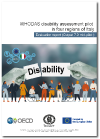
WHODAS disability assessment pilot |
|||
|
Other materials Inception phase | Kick-off meeting agenda and presentations (EN/IT) | 6 December 2021 Action phase | Training agenda: Piloting World Health Organization’s Disability Assessment Schedule (WHODAS) in four regions of Italy (EN/IT) | 3-12 October 2022 Recommandation phase | Translating findings from a disability assessment pilot into policy reform: Considerations and experiences in selected countries | 4 July 2023, Rome, Italy
|
||||||
 |
 |
Related Documents
